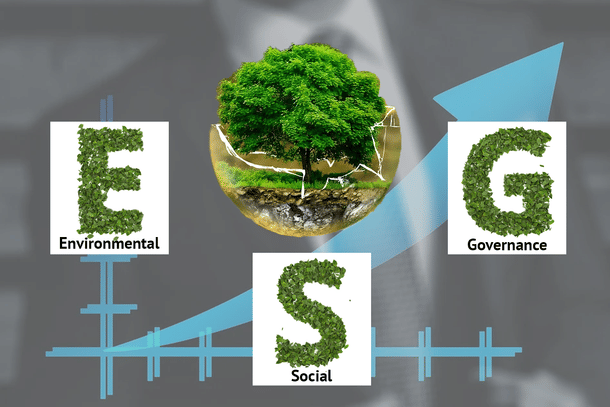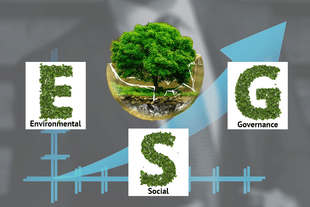Ideas
Why ESG Investing Is The Need Of The Hour And Being Accepted As So Too
Ritu Bhandari
Feb 19, 2022, 05:21 PM | Updated 05:20 PM IST
Save & read from anywhere!
Bookmark stories for easy access on any device or the Swarajya app.


In the backdrop of climate change, ESG (Environmental, Social and Governance) investing is gaining momentum by socially responsible investors.
Environmental criteria is related to the preservation of the environment -How a company contributes to air pollution, water pollution, how it disposes waste, if it uses renewable sources of energy and other climate change actions.
Social criteria is related to policies for the employees. Whether the company provides fair pay/ wages, employee retirement plans, medical benefit, provident fund, pension, other benefits and perks for the employees. Other criteria include employee turnover, employee training programs, diversity, prevention of sexual harassment, inclusion etc. This also covers CSR initiatives and customer protection issues.
Governance criteria includes proper management by the executives at the top. Employees, customers, shareholders’ interests must be safeguarded. There must be complete transparency in financial accounting and reporting. Executive salaries must be fair and not excessive. Regular reporting and disclosures of information and data is important
The Top-Down approach
Many institutional investors are increasingly including ESG performance and rating in their investment mandates and pledging to reduce the carbon emissions in their portfolios.
Morgan Stanley Bank recently conducted a survey that found that nearly 90 per cent of millennial investors were interested in pursuing investments that more closely reflect the values they hold. A lot of companies are disclosing ESG metrics in their reported statements or in a separately issued document.
Both of the two largest exchange-traded fund(ETF) providers – BlackRock and Vanguard – offer clients a choice of ESG-focused funds. BlackRock added six new ESG funds in 2020, and its equity investment team now includes a Head of Sustainable Investing. Brokerage firms now customarily offer stock analysis employing ESG investment strategies, and robo-advisors such as Wealth front can be set to seek out socially responsible investments.
This is consequently impacting market valuation, thereby driving corporates to take cognizance of ESG, adopt the best practices and articulate the same (particularly to the ESG rating agencies).
The governance premium has been generally well recognised by the market and it reflects in the form of lower cost of equity and hence higher market valuation. Increasingly the ESG discount is reflecting in valuation of companies – for eg: well-run, strong franchises such as NTPC (thermal power) and ITC (tobacco) trade at significant discount due to investor apathy.
Indian scene
The Securities and Exchange Board of India(SEBI) mandates the top 1,000 listed companies to prepare an annual Business Responsibility Report (BRR). The Business Responsibility and Sustainability Report (BRSR) will replace the existing BRR and will become mandatory to the top 1,000 listed entities (by market capitalisation) by 2022.
Reports like BRR or BRSR are requiring and encouraging companies to make disclosures on their adoption of responsible business practices, which in turn provide ESG rating agencies with the required information to assess ESG performance of the companies, the basis for investors to make an informed decision on how to devise their ESG portfolios.
Meanwhile, also companies are taking actions to improve their ESG performance and ratings, increasing their chances to be included in ESG portfolios.
For example, Larsen & Toubro, has focused on Cleantech and that has helped in upgrading its ESG Score. Similarly, on the services industry front, IT Major Infosys constituted an ESG Committee at the Board Level reinforcing its commitment to responsible business practices.
Some pertinent questions
While the above are very important and comprehensive in their own right, does the Indian context need more focus and discussion on matters related to governance – from business practices (say reflected in litigation), related party transactions?
Also, companies that drive formalisation of economy (and therefore reduce parallel economy) or financial inclusion are arguably more important for a country like India given its needs.
While what is good for environment is good for all in the long term, there is a cost in the short term. And the key question is are consumers willing to pay more?
For a long period of time, renewable power though environmentally sustainable was more expensive than thermal power. Renewable energy required scale as well as improvement in technology but therein lay the chicken and egg situation – scale was required to bring down the cost but who would bear the cost till scale was achieved. Governments had to subsidise it or mandate power distribution companies for a certain mix. Today, renewable power has achieved almost grid parity.
While India is still in the nascent stage of the ESG evolution, there is a sense that integrating ESG funds into investment decisions isn’t merely an option but a growing imperative. More and more investors want to ensure their investments positively contribute to the planet, people or society.
[The author is the Head of Research at Smahi Foundation and a public policy expert based in Mumbai. The author tweets @Ritu_twt. The views expressed in this article are those of the author and do not represent the stand of this publication]





